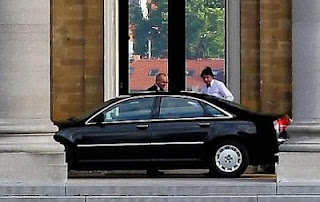Sunday, 29 August 2010
Dead end
After almost two months, the informal negotiations about institutional reform in Belgium – still the preliminary phase (without written agreements) for the real government negotiations – seemed to have ended in deadlock on Sunday morning at 3:30 a.m. The presidents of the seven parties and ‘preformateur’ Elio di Rupo ended ten hours of discussions and three days of political armswrestling without any agreement. They communicated – indirectly – to journalists that the impasse was now total.
Di Rupo went to the palace of Laeken at 6 pm on Sunday and stayed for three hours with King Albert. It was expected that he would hand down his resignation. He left the palace without saying anything to the press, but had previously announced a press conference for Monday shortly before noon. At 9:45 pm the palace issued a message in which it announced that the King had refused di Rupo's resignation and asked him to continue his mission, which he had accepted.
The deadlock was reached on Friday during discussions on the issue of the electoral district of BHV. A solution with most concessions on the French-speaking side seemed at hand, provided it would be linked at a large amount of extra subsidies – 500 million euro, a number to be reached in 2014, regardless of the huge budget deficit of 25 billion euro – for the mainly French-speaking capital region of Brussels.
Especially Bart de Wever at one moment seems to have had cold feet, fearing that he was conceding a lot of hard money to the Brussels region while having obtained only some principal agreement about the Finance Law (see previous blogs), and the responsibility of each region for its own (fiscal) revenues. In his last proposal of compromise Elio di Rupo wanted 300 million euro to be transferred from the federal to the Brussels level immediately as soon as the electoral district of BHV would have been split, as has been asked for decades by the Flemish.
After the failure on Sunday morning the preformateur communicated that he would wait some hours from ‘a signal’ of the parties around the table. Shortly before he went to the palace his spokeswoman let it be known that five parties had accepted Di Rupo’s last proposal, but not the Flemish nationalists and Christian democrats (NVA and CDV).
The deeper cause of this new crisis in the negotiations is of course a lack of mutual trust and a continuing inability to bridge the gap between the points of view of the Flemish and the French-speaking parties. Not without reason Elio di Rupo declared at the beginning of his mission that he would have to try ‘to reconcile the irreconcilables”.
That ambition may now be more utopian than two months ago. As one journalist remarked: “we lack the force to split up the country as much as, for the last three years, we lacked the force to make it work, and that is a dead end of a very annoying kind”
Subscribe to:
Post Comments (Atom)


No comments:
Post a Comment